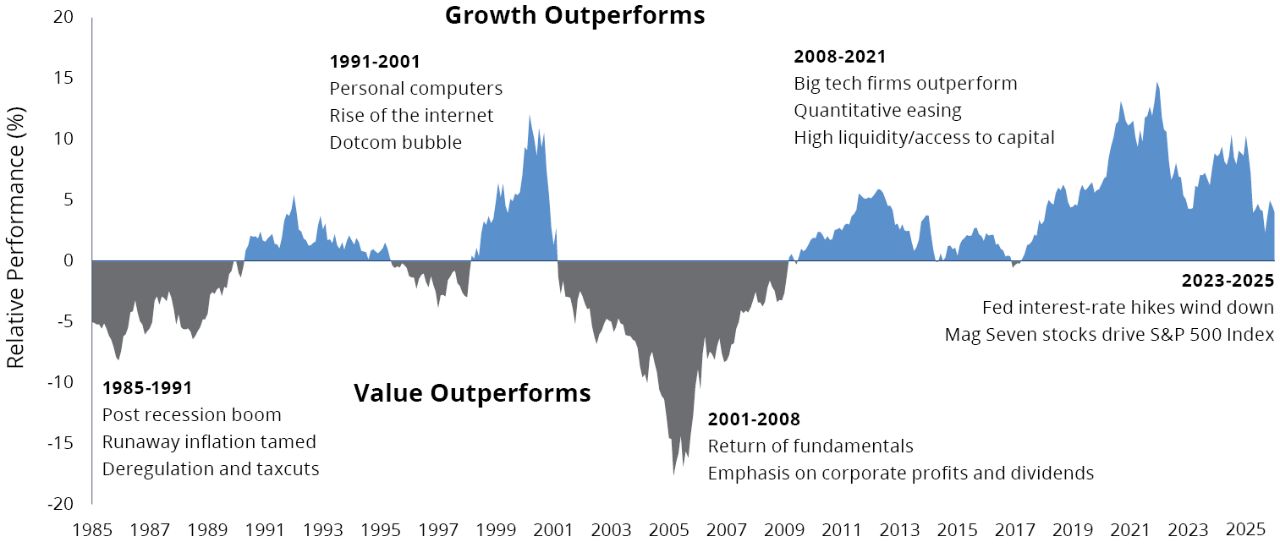History shows that the performance of growth stocks and value stocks has been cyclical. Growth stocks outperformed in the ‘90s during the dotcom era and have performed extremely well for more than a decade. Value stocks outperformed from 2001-2008 as investors placed a greater value on dividends and stock valuations. This cyclical behavior highlights the benefits of having both types of investments in a portfolio.
Russell 1000 Index: Growth vs. Value
Five-Year Monthly Rolling Returns (1985-2025)

As of 12/31/25. Past performance does not guarantee future results. The chart shows the values of the Russell 1000 Growth Index returns minus the Russell 1000 Value Index returns. When the line is above 0, growth stocks outperformed value stocks. When the line is below 0, value stocks outperformed growth stocks. The performance shown above is index performance and is not representative of any Hartford Fund’s performance. Indices are unmanaged and not available for direct investment. For illustrative purposes only. Data Sources: Morningstar and Hartford Funds, 2/26.
Hartford Funds Value Suite*
| Funds (I-Share) | Tickers |
|---|---|
| Hartford Balanced Income Fund | HBLIX |
| Hartford Dividend and Growth Fund | HDGIX |
| Hartford Equity Income Fund | HQIIX |
| Hartford Schroders International Contrarian Value Fund | HFSIX |
| Hartford Schroders International Multi-Cap Value Fund | SIDNX |
| Hartford International Value Fund | HILIX |
| Hartford MidCap Value Fund | HMVJX |
| Hartford Small Cap Value Fund | HSEIX |
Talk to your financial professional today about the allocation to value stocks that's right for you.
* For a full list of Hartford Funds, please visit our product list. Certain classes of Funds are closed to new investors. For more details, see the Fund’s prospectus.
Russell 1000 Growth Index measures the performance of the large-cap growth segment of the US equity universe. It includes those Russell 1000 Index companies with higher price-to-book ratios and higher forecasted growth values.
Russell 1000 Value Index is an unmanaged index measuring the performance of those Russell 1000 Index companies with lower price-to-book ratios and lower forecasted growth values.
Important Risks: Investing involves risk, including the possible loss of principal. • Different investment styles may go in and out of favor, which may cause the Fund to underperform the broader stock market. The Funds listed above have certain associated risks. Please see the prospectus for more information.
The Magnificent Seven stocks are a group of high-performing and influential companies in the US stock market: Alphabet, Amazon, Apple, Meta, Microsoft, NVIDIA, and Tesla.
ETFs are not mutual funds. Unlike traditional open-ended mutual funds, ETF shares are bought and sold in the secondary market through a stockbroker. ETFs trade on major stock exchanges and their prices will fluctuate throughout the day. Both ETFs and mutual funds are subject to risk and volatility.





